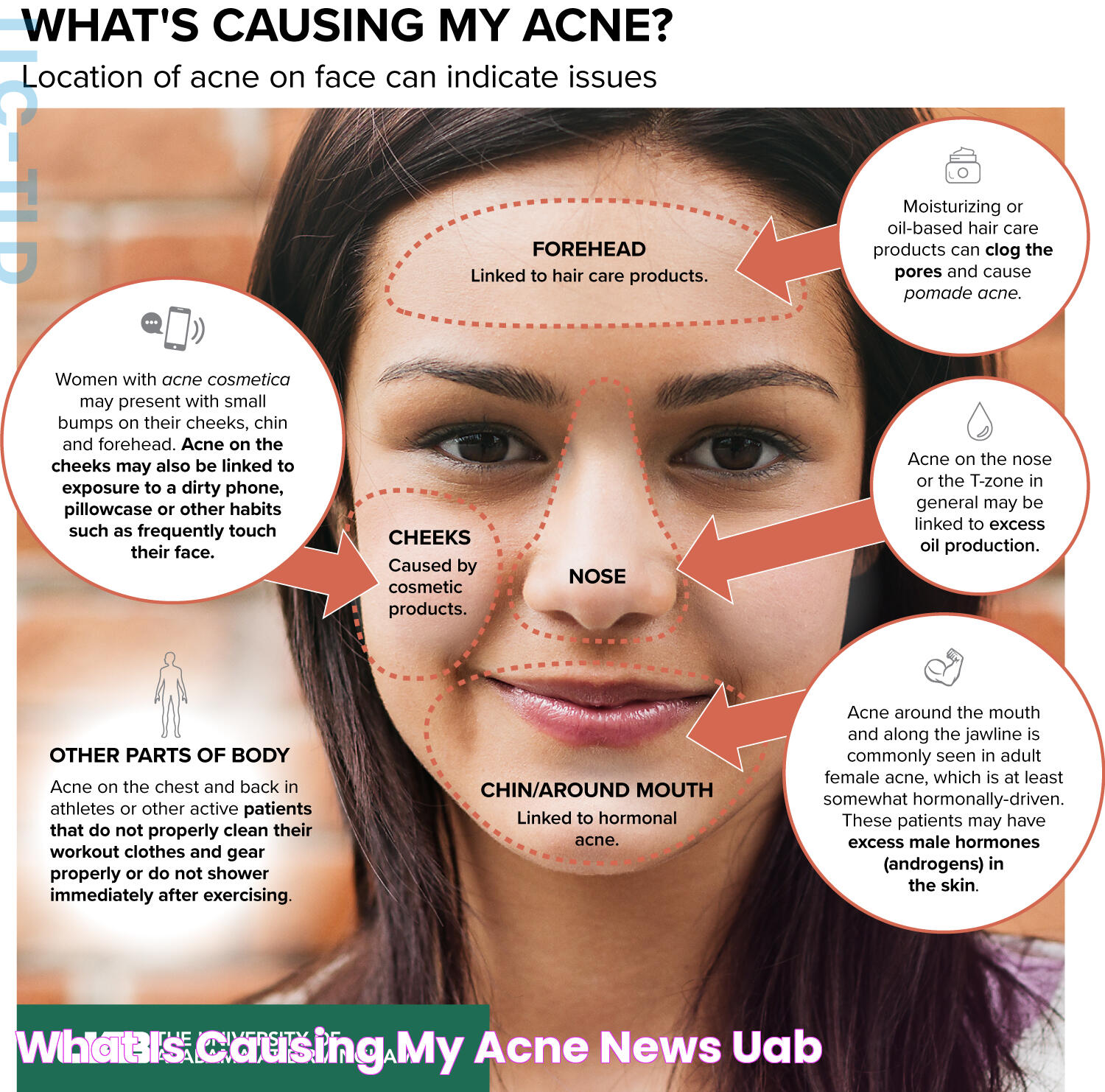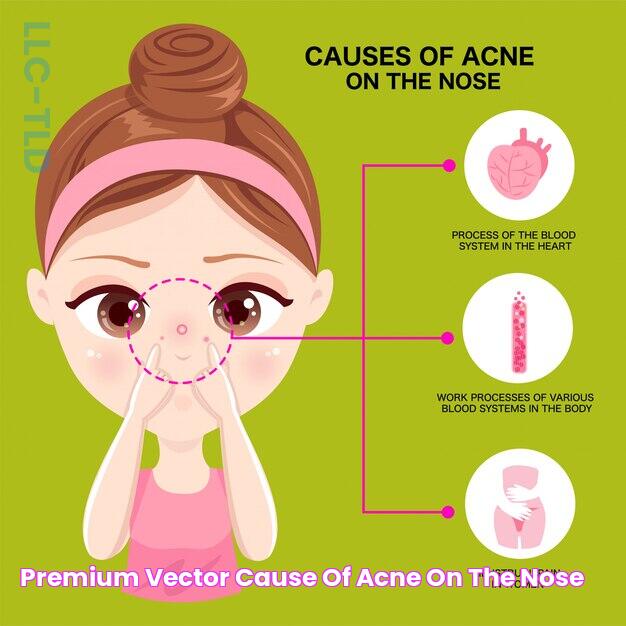If you've ever noticed a pimple on your nose, you might have wondered about its cause and significance. This seemingly minor skin blemish can often be a source of confusion and concern, leading many to search for answers about its underlying meaning. In various cultures and belief systems, the appearance of a pimple on the nose isn't just a skin issue but a symbol rich with potential meanings and interpretations. From health indicators to emotional signals, a pimple on the nose can tell a fascinating story about your body's inner workings.
In this comprehensive guide, we dive deep into the various interpretations and medical explanations of a pimple on the nose. We explore the physiological reasons, potential emotional and spiritual meanings, and effective solutions to address this common skin issue. Through expert insights and well-researched content, we aim to provide you with a thorough understanding of what a pimple on the nose could signify for you.
Our exploration is not only informative but also practical, offering actionable tips and advice for dealing with nose pimples. Whether you're looking for natural remedies, lifestyle changes, or medical treatments, this article has you covered. So, let's embark on this enlightening journey to decode the mysteries of a pimple on the nose.
Read also:Quick Amp Stylish Fast Braiding Hairstyles That Save Time
Table of Contents
- What Causes a Pimple on the Nose?
- Pimple on Nose Meaning: Cultural and Superstitious Interpretations
- Health Indicators Associated with Nose Pimples
- Can a Pimple on the Nose Indicate Emotional Stress?
- Is It Just Acne or Something More?
- Home Remedies to Treat Nose Pimples
- When to See a Dermatologist?
- Lifestyle Changes to Prevent Nose Pimples
- Does Diet Affect Nose Pimples?
- Best Skincare Products for Nose Pimples
- Myths and Misconceptions About Nose Pimples
- Are Natural Remedies Effective?
- Frequently Asked Questions
- Conclusion
What Causes a Pimple on the Nose?
The nose is a prime spot for pimples due to its high concentration of oil glands. Several factors can contribute to the development of a pimple on the nose:
- Excess Oil Production: The nose is part of the T-zone, which is known for excessive oil production. This can lead to clogged pores and pimples.
- Bacterial Infection: The presence of bacteria on the skin can infect clogged pores, resulting in pimples.
- Hormonal Changes: Hormones can increase oil production, especially during puberty, menstruation, or stress.
- Poor Skincare Routine: Not cleansing the skin properly or using comedogenic products can contribute to pimples.
- Dietary Factors: Some studies suggest that high-glycemic diets and dairy products can exacerbate acne.
Pimple on Nose Meaning: Cultural and Superstitious Interpretations
Throughout history, people have sought to understand the deeper meaning behind physical manifestations like pimples. In various cultures, a pimple on the nose has been interpreted symbolically:
- Love and Romance: In some cultures, a pimple on the nose is thought to indicate upcoming romantic interest or a new admirer.
- Good Fortune: It is sometimes seen as a sign of impending good luck or an unexpected windfall.
- Emotional Turmoil: Some believe that a nose pimple can signify internal conflict or stress, reflecting the body's inner turmoil.
While these interpretations are not scientifically proven, they offer an intriguing glimpse into how different cultures perceive bodily changes.
Health Indicators Associated with Nose Pimples
A pimple on the nose can sometimes be a reflection of underlying health issues. Here are some potential health indicators:
- Rosacea: This chronic skin condition commonly affects the nose, causing redness and visible blood vessels.
- Rhinophyma: A severe form of rosacea that can lead to a bulbous, red nose with prominent pores.
- Sinus Issues: Chronic sinusitis might contribute to inflammation and pimples around the nose area.
It's important to monitor persistent or severe cases and consult healthcare professionals if needed.
Can a Pimple on the Nose Indicate Emotional Stress?
Emotional stress is often linked to various skin conditions, including acne. When you're stressed, your body releases cortisol, a hormone that can increase oil production and exacerbate acne:
Read also:Britney Spears Perfume A Timeless Fragrance Collection
- Stress and Hormones: Stress causes hormonal fluctuations that can lead to increased oil production and clogged pores.
- Behavioral Responses: Stress might lead to poor skincare habits, such as skipping cleansing or picking at skin, which can worsen pimples.
Managing stress through relaxation techniques, exercise, and proper sleep can help mitigate its impact on your skin.
Is It Just Acne or Something More?
While pimples on the nose are often attributed to acne, they can sometimes signal more serious conditions:
- Folliculitis: An infection of hair follicles that can appear similar to acne.
- Skin Cancer: Rarely, a persistent pimple-like bump on the nose may require evaluation for skin cancer.
It's crucial to observe any changes and consult a dermatologist if a pimple doesn't heal or exhibit unusual characteristics.
Home Remedies to Treat Nose Pimples
Many prefer natural remedies for treating nose pimples. Here are some popular options:
- Tea Tree Oil: Known for its antibacterial properties, it can be applied topically to reduce inflammation.
- Aloe Vera: Acts as a natural anti-inflammatory and soothes irritated skin.
- Ice Application: Applying ice can reduce swelling and redness.
Always conduct a patch test before trying new remedies to ensure no allergic reactions occur.
When to See a Dermatologist?
While most nose pimples can be managed at home, certain situations warrant a visit to a dermatologist:
- Persistent Pimples: If pimples last more than a few weeks despite treatment.
- Severe Pain or Swelling: Could indicate an infection or cyst that needs medical attention.
- Scarring: Professional treatments might be necessary to prevent or reduce scars.
Consulting a dermatologist can provide personalized treatment options and address underlying causes.
Lifestyle Changes to Prevent Nose Pimples
Adopting a healthy lifestyle can significantly reduce the occurrence of nose pimples:
- Regular Cleansing: Cleanse your face twice daily to remove excess oil and dirt.
- Non-Comedogenic Products: Use skincare and makeup products that do not clog pores.
- Stress Management: Engage in activities like yoga or meditation to reduce stress levels.
Consistency in skincare routines and lifestyle choices plays a crucial role in maintaining clear skin.
Does Diet Affect Nose Pimples?
Diet can have a significant impact on skin health, including the potential to cause or exacerbate pimples on the nose:
- Sugar and Carbohydrates: High-glycemic foods can trigger insulin spikes, leading to increased oil production.
- Dairy Products: Some individuals find that dairy exacerbates their acne symptoms.
- Hydration: Drinking plenty of water helps maintain skin hydration and flush out toxins.
Adopting a balanced diet rich in fruits, vegetables, and lean proteins can promote healthier skin.
Best Skincare Products for Nose Pimples
Choosing the right skincare products can help manage and prevent nose pimples:
- Salicylic Acid: Helps exfoliate the skin and clear clogged pores.
- Benzoyl Peroxide: Kills acne-causing bacteria and reduces inflammation.
- Retinoids: Encourage cell turnover to prevent clogged pores.
Consulting with a dermatologist can help determine the most suitable products for your skin type.
Myths and Misconceptions About Nose Pimples
Several myths surround the topic of nose pimples, leading to misconceptions:
- Myth: Only teenagers get acne.
Fact: Acne can affect individuals of all ages. - Myth: Popping pimples speeds up healing.
Fact: Popping can cause infection and scarring. - Myth: Poor hygiene is the main cause.
Fact: Acne is often influenced by hormones and genetics.
Understanding these myths can help you make informed decisions about your skincare routine.
Are Natural Remedies Effective?
Natural remedies can be effective for treating mild nose pimples, but results vary:
- Pros: Fewer side effects, cost-effective, and often easy to find.
- Cons: May not be as potent as medical treatments, and results can take longer to see.
Natural remedies can complement medical treatments but are best used under guidance for severe cases.
Frequently Asked Questions
- Can stress cause pimples on the nose? Yes, stress can lead to hormonal changes that increase oil production, resulting in pimples.
- Are nose pimples a sign of a health problem? While often benign, persistent pimples may indicate underlying health issues and should be evaluated by a healthcare professional.
- Do certain foods cause nose pimples? High-glycemic foods and dairy products may contribute to acne in some individuals.
- How can I prevent nose pimples? Maintain a regular skincare routine, manage stress, and adopt a healthy diet.
- Is it safe to pop a nose pimple? Popping pimples can lead to scarring and infection; it's best to let them heal naturally or seek professional treatment.
- When should I see a dermatologist for a nose pimple? Consult a dermatologist if the pimple is persistent, painful, or causes significant distress.
Conclusion
A pimple on the nose can be more than just a cosmetic concern; it can reflect various internal and external factors. From cultural meanings to health indicators, understanding the implications of a nose pimple provides valuable insights into your overall well-being. By adopting effective skincare routines, lifestyle changes, and consulting professionals when necessary, you can manage and prevent nose pimples effectively. Remember, taking care of your skin is an ongoing process that benefits from both informed decisions and consistent efforts.

